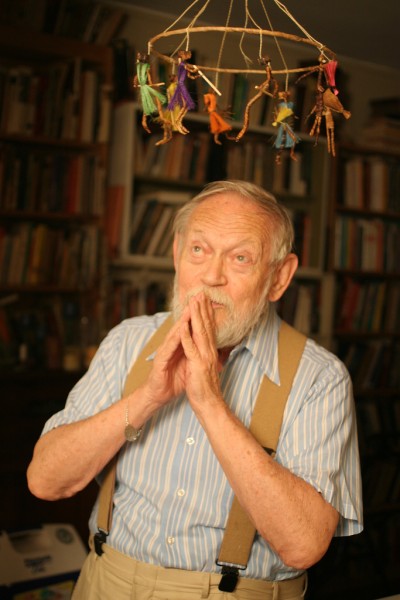
Amos Vogel’s continuing impact on the world of independent, foreign, and experimental film is the focus of series at Anthology Film Archives
FILM AS A SUBVERSIVE ART: AMOS VOGEL AND CINEMA 16 (Paul Cronin, 2003)
Anthology Film Archives
32 Second Ave. at Second St.
Thursday, March 7, 9:00
Series runs through March 16
212-505-5181
anthologyfilmarchives.org
 Vienna-born Amos Vogel was one of the all-time-great film programmers, running Cinema 16 from 1947 into the 1960s, where he screened alternative, avant-garde, foreign-language, scientific, and other controversial works that had never before been seen in America. In the documentary Film as a Subversive Art, named after Vogel’s seminal 1974 book on experimental film, director Paul Cronin follows him as he walks around the Village, stopping by familiar places where his career began. Vogel also opens up his home and office to the camera for a fascinating look into his unique world. A radical leftist, he eagerly fought censorship to bring new ideas to adventurous moviegoers. All the while he was involved in a wonderful love story with his wife of more than sixty years, Marcia. Vogel, who died last April at the age of ninety-one — and should have been included in the Oscar segments devoted to those film people who passed away in 2012 — also was the founder and first director of the New York Film Festival. Oh, he was also the professor who got me into the NYU Cinema Studies graduate school program, so I might be somewhat biased — and probably wouldn’t even be writing this without him, something I reminded him of every time I would see him at the New York Film Festival. But judging from the people who showed up when this film was screened at the 2003 Tribeca Film Festival, including filmmakers, teachers, and other programmers, I’m not the only one who realized Vogel’s importance to cinema and New York City. The film is screening March 7 at 9:00 at Anthology Film Archives as part of the series “A Tribute to Amos Vogel and Film as a Subversive Art,” celebrating his lasting impact on the world of film. At the beginning of the book, Vogel writes, “This is a book about the subversion of existing values, institutions, mores, and taboos — East and West, Left and Right — by the potentially most powerful art of the century. It is a book that trafficks in scepticism towards all received wisdom (including its own), towards eternal truths, rules of art, ‘natural’ and man-made laws, indeed whatever may be considered holy. It is an attempt to preserve for a fleeting moment in time — the life of this book — the works and achievements of the subversives of film.” Vogel has preserved these moments a whole lot longer than that. The film will be preceded by Andre St. Laurent’s 1963 documentary Camera Three: New York Film Festival 1963, a half-hour look into the founding of the New York Film Festival by Vogel and Richard Roud, featuring such directors as Adolfas Mekas and Joseph Losey.
Vienna-born Amos Vogel was one of the all-time-great film programmers, running Cinema 16 from 1947 into the 1960s, where he screened alternative, avant-garde, foreign-language, scientific, and other controversial works that had never before been seen in America. In the documentary Film as a Subversive Art, named after Vogel’s seminal 1974 book on experimental film, director Paul Cronin follows him as he walks around the Village, stopping by familiar places where his career began. Vogel also opens up his home and office to the camera for a fascinating look into his unique world. A radical leftist, he eagerly fought censorship to bring new ideas to adventurous moviegoers. All the while he was involved in a wonderful love story with his wife of more than sixty years, Marcia. Vogel, who died last April at the age of ninety-one — and should have been included in the Oscar segments devoted to those film people who passed away in 2012 — also was the founder and first director of the New York Film Festival. Oh, he was also the professor who got me into the NYU Cinema Studies graduate school program, so I might be somewhat biased — and probably wouldn’t even be writing this without him, something I reminded him of every time I would see him at the New York Film Festival. But judging from the people who showed up when this film was screened at the 2003 Tribeca Film Festival, including filmmakers, teachers, and other programmers, I’m not the only one who realized Vogel’s importance to cinema and New York City. The film is screening March 7 at 9:00 at Anthology Film Archives as part of the series “A Tribute to Amos Vogel and Film as a Subversive Art,” celebrating his lasting impact on the world of film. At the beginning of the book, Vogel writes, “This is a book about the subversion of existing values, institutions, mores, and taboos — East and West, Left and Right — by the potentially most powerful art of the century. It is a book that trafficks in scepticism towards all received wisdom (including its own), towards eternal truths, rules of art, ‘natural’ and man-made laws, indeed whatever may be considered holy. It is an attempt to preserve for a fleeting moment in time — the life of this book — the works and achievements of the subversives of film.” Vogel has preserved these moments a whole lot longer than that. The film will be preceded by Andre St. Laurent’s 1963 documentary Camera Three: New York Film Festival 1963, a half-hour look into the founding of the New York Film Festival by Vogel and Richard Roud, featuring such directors as Adolfas Mekas and Joseph Losey.